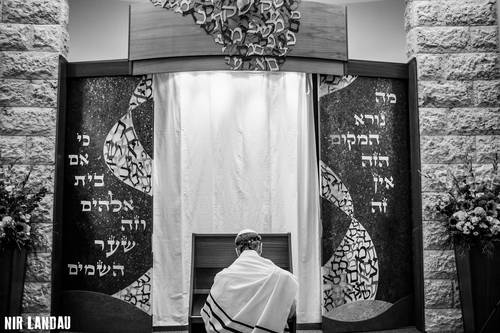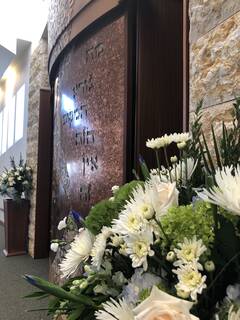B'nei Mitzvah

If you would like to celebrate your child's Bat/Bar Mitzvah at Shaarei, please set up a time to meet with Rabbi Samuels to discuss your child's upcoming celebration by contacting our office.
Additionally, Rabbi Samuels offers our B'nei Mitzvah families the option of having their child learn Torah with him toward a Bar/Bat Mitzvah Derashah, as part of a pre-Bar/Bat Mitzvah program of preparation for a life of Torah and mitzvot.
Preparing for a Bat/Bar Mitzvah - A Celebration of a Lifetime by Rabbi Benjamin J. Samuels
A year and a half or so before a girl's twelfth birthday, or a boy's thirteenth birthday, I meet with the child and her or his parents in my study at our shul. The goal of this initial meeting is to discuss the child's upcoming Bat/Bar Mitzvah and to help outline a program of educational preparation. Our conversation begins and ends with the child her-or-himself. This meeting is not about the child's parents and their expectations, however important they may be. It is not about our community's celebrative norms, although standardized practices can positively shape our communal religious culture. It is certainly not about what the child's friends plan for their own Bat/Bar Mitzvah celebrations, even though we must be guardedly respectful of peer pressures. "Chanokh la'na'ar/ah al pi darko/ah - Train a child in accordance with his/her way" (cf. Proverbs 22:6) instructs us that education begins with the teacher understanding the student. Our initial meeting, therefore, aspires to excite and empower the ten-and-a-half/eleven-and-a-half year old sitting in the rabbi's study with the beginnings of a personalized Bat/Bar Mitzvah development plan.
During the conversation that ensues, we briefly study the beloved teaching in Avot (1:2): "The world stands on three things: Torah, Avodah, v'Gemilut Chasadim - Study, Prayer, and Acts of Kindness." This tripartite Jewish mission statement serves as the curricular frame for Bat/Bar Mitzvah training. In preparing for a purposeful life of Torah u'Mitzvot, for becoming a Bat/Bar Mitzvah - literally, the daughter/son of mitzvah - every girl and boy should undertake a Torah-learning project, a commitment to grow in her appreciation and experience of tefillah, and a chesed activity, all independent of formal schooling and individually tailored to teh child's strengths and interests.
Kinyan Torah - that is, achieving a sense of relevant relationship to and personal ownership of our sacred literary tradition - guides our Torah learning project. For some, this is best accomplished, though not exclusively so, through learning to read from a Sefer Torah, and in addition to our regular minyanim at which young men may layn, our shul proudly supports an active women's tefillah group at which many young women celebrate their Bat Mitzvah through reading from a Torah. Learning ta'amei haMikra, memorizing unpunctuated text and singing the words of the Torah in sync with the natural rhythms of biblical Hebrew, uniquely connects a person to Torah.
For other children, studying TaNaKh or mishnayot toward a siyyum with their father or mother may be their preferred project. The gift of shared study time with a parent can have an enduring impact on both child and parent. For the past few years, our community's women's learning organization, Ma'ayan·(www.maayan.org), has hosted the Matan Mother-Daughter Bat Mitzvah learning project, which provides a wonderful opportunity for such shared Torah learning. For children with specialized learning needs, an individually tailored learning project focused on a topic of interest taught through an appropriate pedagogic modality works best.
 In our shul of approximately two hundred and fifty families, I offer to make the time for a weekly chevrutah with every child preparing for her or his Bat/Bar Mitzvah. Spending a half-hour each week with each child adds up to a considerable investment of time, but provides me an immeasurable privilege and opportunity to inspire and connect with my young congregants during this formative period of their lives.
In our shul of approximately two hundred and fifty families, I offer to make the time for a weekly chevrutah with every child preparing for her or his Bat/Bar Mitzvah. Spending a half-hour each week with each child adds up to a considerable investment of time, but provides me an immeasurable privilege and opportunity to inspire and connect with my young congregants during this formative period of their lives.
For the vast majority of B'neiMitzvah, the learning project culminates in the creation of a d'var Torah that s/he will deliver from our pulpit after tefillah on the Shabbat morning of her or his celebration. With poise and confidence, the young Bat/Bar Mitzvah becomes our community's teacher of Torah. In most cases, delivering a Bat/Bar Mitzvah d'rasha is an esteem-building and religiously empowering experience. However, during the year-long Bat/Bar Mitzvah preparation, I emphasize that the purpose of the Torah learning project is not to write a speech. The d'var Torah emerges from an autonomous encounter with Torah; the speech should be treated as a secondary outcome, not a primary objective.
For observant Jews, tefillah serves as a personal spiritual practice that connects us to God, self, and community. It is a regularly exercised rite during which we aspire to match attention and intention with our words and gestures. It is not an easy discipline for an adult, let alone for a young adolescent. Yet, it is crucial for religious communal socialization and advancing spiritual growth for each child on the cusp of Jewish adulthood to hind her or his place within the davening community. Our Shul's Shabbat morning youth services work toward this goal, beginning at an earlier developmental stage. During the year before a Bat/Bar Mitzvah, concerted attendance by parent and child at regular minyan, and, if so inclined, for an aspiring Bat Mizvah also at Women's Tefillah, comprises an important component of the emerging young person's preparation for Jewish religious communal life. Sharing these tefillah experiences in shul with friends her/his age contributes to the healthy formation of a supportive religious youth culture.
Finally, I encourage each Bat Mitzvah girl, and Bar Mitzvah boy, to develop a plan for a significant chesed project to be carried out with a member of her/his family or through partnership with a friend or two. Although I am of course an advocate of tzedakah, I generally discourage money-raising projects, preferring hands-on, person-to-person acts of chesed. For example, young women and men in our shul have regularly visited Jewish nursing homes and performed with their musical instruments for the residents. Another young woman and her mother furnished a room at a battered woman's shelter and visited the shelter weekly to read to the children in residence. Yet another young man played chess and discussed Torah with an elderly, home-bound couple in our community. Whereas tzedakah aspires to anonymity, chesed knowingly knits people together through acts of kindness, as Tehillim (89:3) teaches: "Olam chesed yibaneh - the world is built through chesed." Thus, the young woman/man emerges into the age of Jewish responsibility by building up community.
After outlining the recommended curriculum and interactively constructing an individualized Bat/Bar Mitzvah plan, I reiterate that becoming a Bat/Bar Mitzvah is about a serious, yet fun, program of preparing for a life of Torah u'Mitzvot. Being a Bat/Bar Mitzvah ultimately is not about a day of celebration, however glorious we will work to make it. Becoming a Bat/Bar Mitzvah begins a wonderful, new stage of religious status, ennobling obligation, and joyous responsibility in a young person's life. To highlight this idea and de-emphasize the performance aspect of the Bat/Bar Mitzvah celebration further still, I recommend that the family plan to celebrate the young woman or man's "bo bayom" - the exact Hebrew date on which s/he will tum 12/13 and halakhically transform into a Bat/Bar Mitzvah. This can easily be accomplished by arranging for a small family se'udat mitzvah on the night of her twelfth or his thirteenth Hebrew birthday, at which s/he can perform her/his first mitzvah as a Bat/Bar Mitzvah and lead the family in the recitation of the evening Shema or make HaMotzi for the family.
All of this can be quite daunting for a ten-and-a-half/eleven-and-a-half year old, though in my experience it is most intimidating for parents organizing their eldest child's Bat/Bar Mitzvah. It is hard for a young child, and even for her/his parents, to anticipate all of the changes-emotional, developmental, and biological changes that will transpire over the next 18 months. I always remind the pre-B'nei Mitzvah childrenl and their parents that we don't have to worry right now about what the child will actually perform at her/his Bat/Bar Mitzvah. Let's start by beginning with their preparations. A sense of achievement and progress in their preparations will assuredly build their confidence in their own skills and knowledge and put them at greater ease with the performative elements of their Bat/Bar Mitzvah festivities. More importantly, a positive experience during preparation for the Bat/Bar Mitzvah will teach that becoming a Bat/Bar Mitzvah is not about a performance or a party for a day, but a celebration of a lifetime.
This essay was originally published as "Preparing for a Bat Mitzvah: A Celebration of a Life Time," for the JOFA Journal (Fall 2010 - Tishrei 5771).
